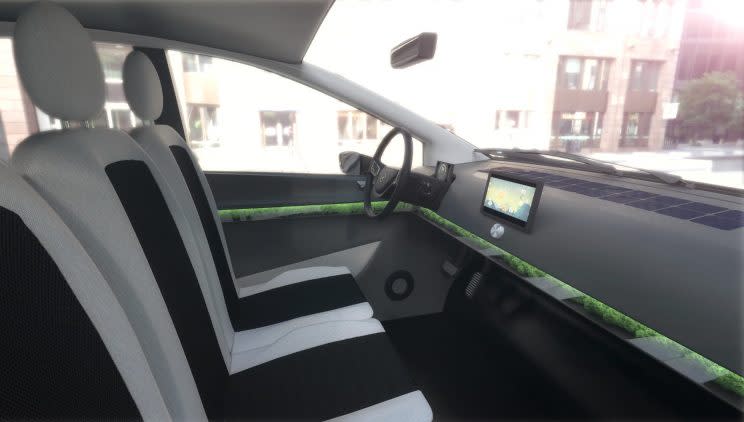Electric car that can charge itself in development by German startup

One of the major roadblocks holding electric vehicles back from widespread adoption is the lack of charging stations, which would allow owners to travel further distances and get back on the road faster without worrying about running out of power.
But a German startup may have found a way to offset some of this range anxiety at a low price point.
Sono Motors has developed a compact electric van called the “Sion,” which is covered in integrated solar cells that charge its battery while on the road or parked.
The Sion will be offered in a base model called the “Urban” for about $17,000 and the beefier “Extender” for roughly $23,000, and have ranges of 120 km and 250 km respectively.
However, its viSono solar-charging system — which uses monocrystalline silicon cells that are covered by an 8-millimetre layer of shatterproof and weather-resistant polycarbonate — can generate an additional 30 kilometres a day.
“In the morning, you drive to work in your Sion, and when you’re off at 5 p.m., the battery is fully recharged, thanks to the solar cells,” claims the company on its website.
Sono Motors said the Extender, with its 30 kilowatt-hour battery can be charged up to 80 per cent capacity, or 200 km range, in 30 minutes, at a station with alternating current of 43 kW.
Meanwhile, the Urban’s smaller battery – which is designed for city drivers – can get the same amount of juice in the same amount of time from stations of up to 22 kW AC.

Range has become a major selling point for electric vehicles, with top-of-the-line models such as Tesla’s Model S starting at $92,600 and the Model X at $101,000 for ranges of 338 km and 321 km respectively.
However, despite the sale of more than 21,000 plug-in-electric vehicles in Canada since 2011, charging stations that are needed for drivers to extend their car’s range have yet to become widespread across Canada, with many being concentrated in major cities.
The Government of Ontario announced last year that it was planning on providing $20 million in grants to create a network of level 3 chargers that can recharge a car back up to 80 or 90 per cent of its capacity in less than 30 minutes.
At the time, there were only five of these quick-charge stations in the province, despite there being 5,400 registered electric vehicle owners.
Other provinces are also attempting to boost their presence. There were more than 30 in Quebec as of April, and the government is aiming to get an additional 30 on the road by the end of the year.
Meanwhile, B.C. put $6.5 million towards the cause five years ago, and now has a “fairly robust network.”
Sono Motors’ efforts stand apart from these initiatives, and so far, consumers have been receptive to the technology.
In July, the company announced that it had created a prototype of the Sion and that it was launching a crowdfunding page on Indiegogo with the goal of raising money to reproduce it for crash test and trial runs.
For a donation of about $150 consumers could reserve a Sion and decide whether or not they want to buy one after they’re available for a test drive in 2017.
Sono Motors hopes to roll out Sions for delivery across the European Union, Switzerland, the United Kingdom, India, the United States, Canada and Australia in 2018.
As of Sept. 20, the company had exceeded its goal, with more than $311,000 raised.
“We were overwhelmed by the support of the Indiegogo supporters,” co-founder Jona Christians told Yahoo Canada Finance in an email.
“We got hundreds of emails from supporters with tips … assistance or even free support.”
Christians said time is the main challenge facing the company, but there is a “huge market” for the Sion with city-dwelling commuters, as well as businesses, such as those that use car sharing or fleets of vehicles.
“Especially for commuters in an urban environment, because the Sion would recharge itself every time you are at work,” he said.
Christians started Sono Motors in his garage along with co-founders Laurin Hahn and Navina Pernsteiner four years ago in an effort to create an environmentally-sustainable method of travel.
“We see oil as a big threat and there is no other way than getting our transport towards electromobility since in big cities air pollution is a big problem,” he said.
“Back then, we just didn’t want to wait till the (electronic vehicle) comes to a breakthrough.”
Hahn wrote on the company’s Indiegogo page that they are “simple people” who are hoping their car will help “protect the environment.”
“We finally want to see some changes and can’t stand watching our environment being destroyed any longer,” Hahn wrote.
“With (Sion’s) integrated solar cells, we ensure that a large part of its energy comes from a renewable energy source – the Sun.”

 Yahoo Finance
Yahoo Finance 
